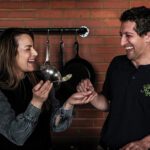Market growth in Matthews
June 1, 2021

This year, the Matthews Community Farmers’ Market celebrates its 30th anniversary. Every Saturday, shoppers from home cooks to professional chefs stroll side by side, eagerly awaiting the season’s bounty.
by Ben Jarrell • photographs by Michael Hrizuk
For locals, the Matthews Community Farmers’ Market is a place to connect with neighbors, regional growers and artisans. What began with fewer than a dozen vendors has blossomed into a thriving hub of more than 50, with a busy Saturday morning at the market now hosting about 1,200 visitors. Astonishingly, four original farmers remain. Sammy Koenigsberg of New Town Farms in Waxhaw is one of those farmers. The group also includes Jenifer and Dean Mullis, who run Laughing Owl Farm in Richfield. Two farms have been passed down to sons — Keith Mundie of Big Oaks Natural Farm and Jim Mundorf of Nut Hill Farms. “We have a whole slideshow from those early years,” Koenigsberg says. “Dean had a mullet. I had hair. We all fit back in that little space where I am. That’s where we started.”
In August of last year, my wife and I moved with our daughter to the township of Matthews, a quiet suburb in southeast Mecklenburg County with a population of about 32,000. Despite a busy workweek and a baby keeping us always elated but oftentimes exhausted, our weekends begin by packing up the stroller and making our way to North Trade Street, the main thoroughfare through downtown. Being recent transplants from Charlotte, the Matthews Community Farmers’ Market has been an anchor point for our family — a place where we start our grocery list, plan healthful meals and create tradition.
But the farmers market brings more than fresh produce and baked goods to downtown Matthews, which itself has enjoyed a revitalization in the three decades since the market opened. It grows togetherness and sells the idea that we don’t need to venture far to find health and happiness.
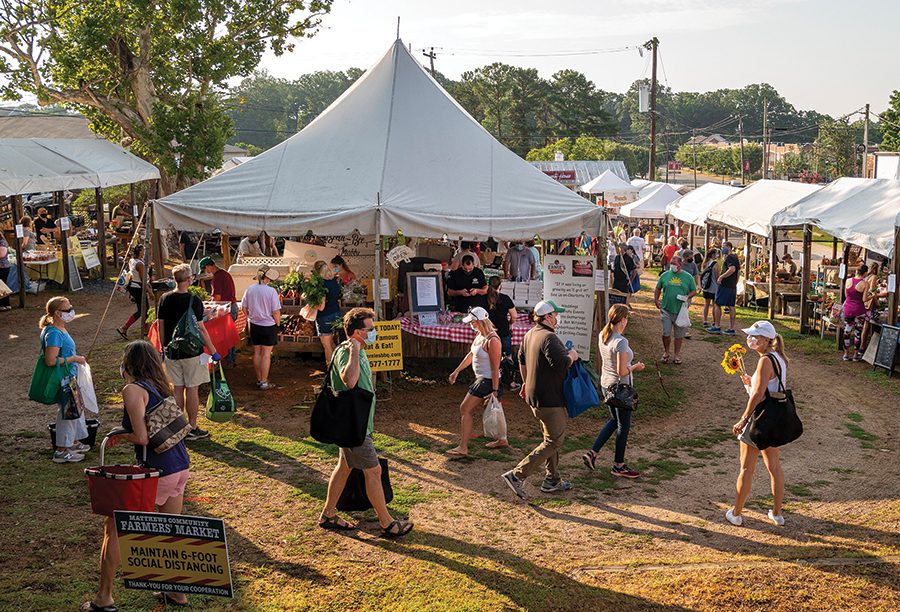
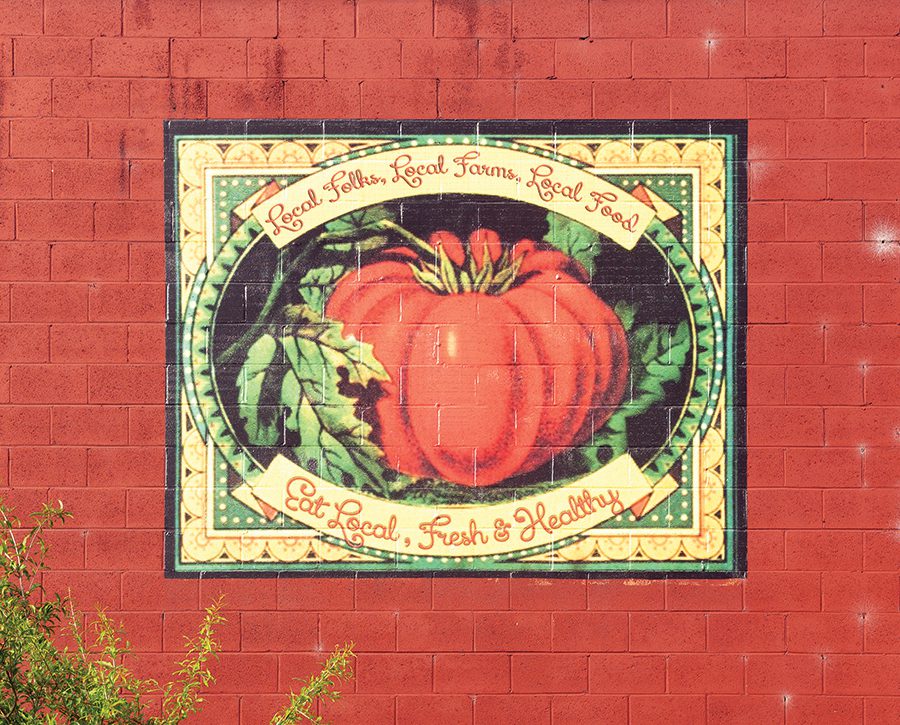
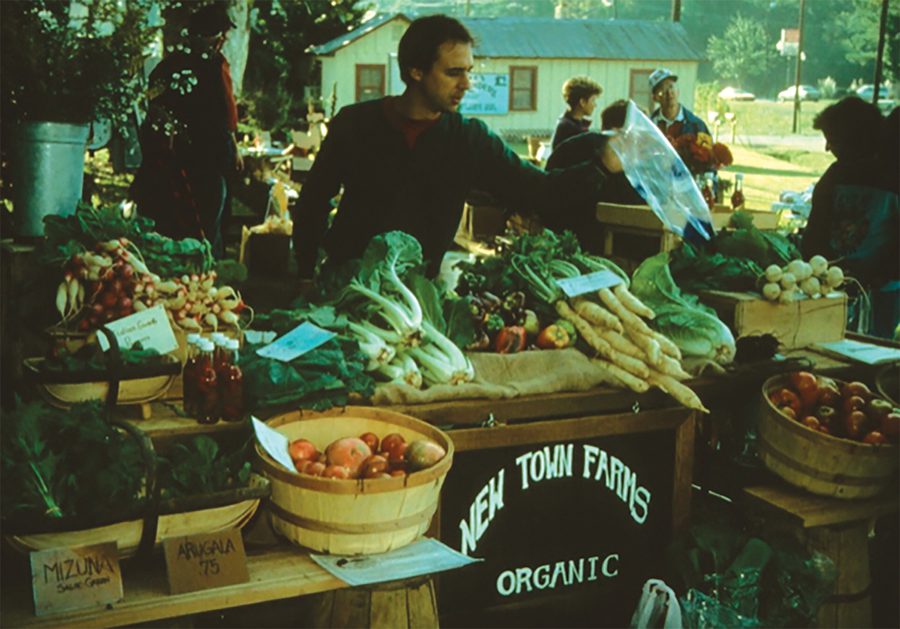
Koenigsberg, who owns New Town Farms with his wife, Melinda, created the market in 1991 after consulting with friend Kevin Carpenter, a volunteer member of the Downtown Matthews Inc. committee responsible for enlivening the district. Modeling other producer-only markets like the one in Carrboro outside Chapel Hill, Koenigsberg wanted to feature farms and artisans within a strict 50-mile radius. Now in its 30th year, the market is a landmark in the heart of the community.
Renfrow Hardware has leased the land to the market for the last 30 years — at a dollar a year. Owner David Blackley, says Koenigsberg, was crucial in bringing the vision to bear.
“We used to have all of our meetings around the potbelly stove up there, in the early days,” Koenigsberg says. “David — very much as a gardener himself — bought into the idea and sponsored us. We couldn’t have done it without him.”
Koenigsberg grew up with his father, Nathan, on the 50-acre farm in Waxhaw (11 miles south of Matthews), planting a row of willow oaks that now tower above the gravel road leading to his 4 acres of growing fields. In spring and again in the fall, it’s roots and greens — from carrots to beets to lettuces to collards. On a ride through his fields in late April, Koenigsberg points to his daughter, Noey — one of the couple’s eight children who grew up on the farm — tending rows of cauliflower, cabbage, broccoli, kale, Brussels sprouts and other brassicas. But it’s during the summertime when the market truly shines.
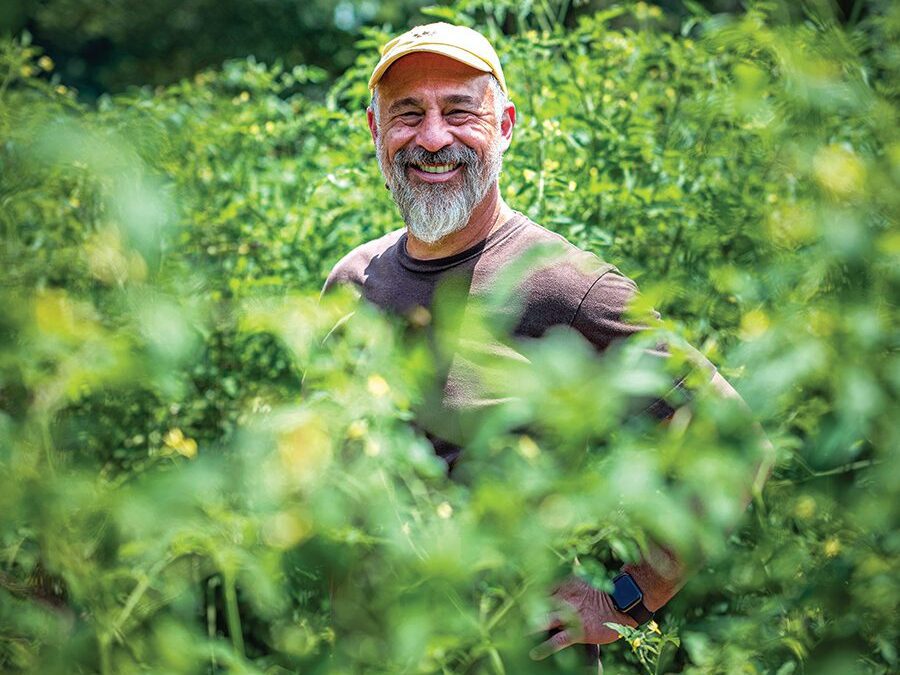
“Summer for us means tomatoes,” Koenigsberg says. Heirloom varieties from Cherokee Purples to small Sungolds are sold alongside Southern staples such as squash, cucumbers, eggplants and cantaloupes.
Heritage chickens at New Town Farms forage for bugs and grass, get plenty of exercise, and in turn, build fat and flavor. Similarly, Koenigsberg raises a particularly wild breed of heirloom pigs called Ossabaws. A favorite of Southern chefs and pitmasters, these hogs are turned into everything from breakfast sausage to Boston butts for local barbeque enthusiasts.
While Koenigsberg uses the farm as his primary means of income, other vendors like Keith Mundie of Big Oaks Natural Farm, whose father, Fred was one of the original vendors, do it for the love of the market. Over the years, it’s been a family effort as Mundie worked alongside his wife, son and daughter to offer seasonal produce from arugula to okra to tomatoes. “We all work full-time jobs. This is just a hobby,” Mundie says. “I enjoy coming up here. Yes, it’s hard work. But I don’t like sitting around the house watching TV.”

Longtime market manager Pauline Wood retired in 2017, allowing Paulette Wilkes, a baker who operated a patisserie stall at the market, to take over management, along with assistant manager Jessica Thomas, previously a volunteer. One of their first initiatives was to designate the market as a 501(c)(3), allowing for tax-deductible donations. Wilkes also worked with state and local government officials like Abby Wyatt, food security coordinator for Mecklenburg County Public Health, to allow SNAP payments for use in the market. Wilkes says this has been critical over the past year. “These were people who were not being served by us,” Wilkes says, pointing out that the market is on track to more than double its SNAP sales from 2020. “It’s a more diverse community we’re now serving. People call it their ‘happy place.’”
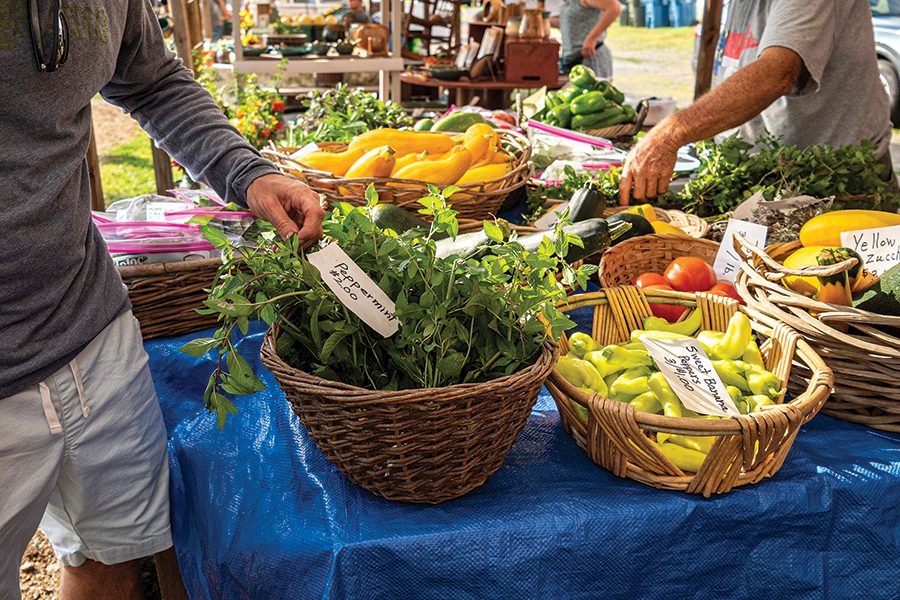
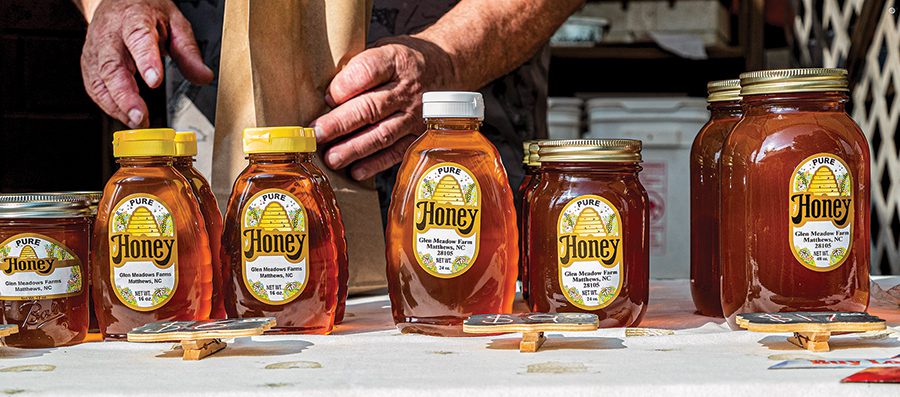
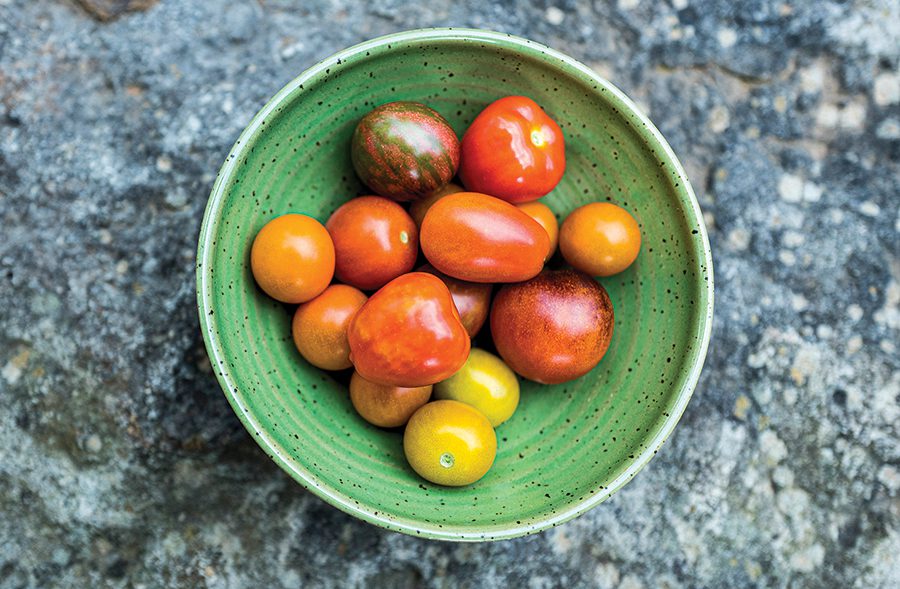
While I’m talking with Koenigsberg, a woman leaving the market yells over the crowd, “Bye, Sammy!” Koenigsberg replies, calling her by name. “Bye, Kaitlyn. Good to see you!” It’s like that when you’re at the Matthews Community Farmers’ Market. You go for fresh-picked fruits and vegetables, artisanal breads and vegan donuts, and handmade goods from wooden cutting boards to ceramic coffee mugs. But you keep coming back for that comforting feeling, for the realization that no matter where everybody is during the week, no matter how busy we get, there’s a place we can slow down and be with each other on another warm Saturday morning. SP
ON THE FARM
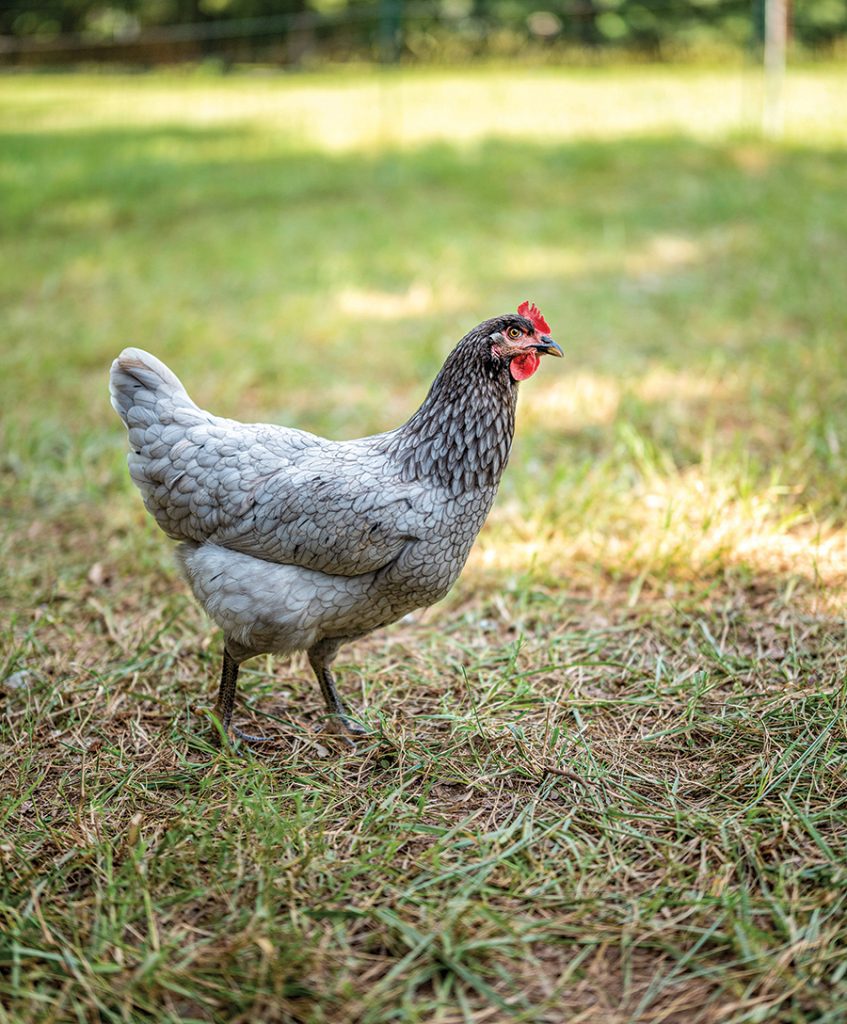

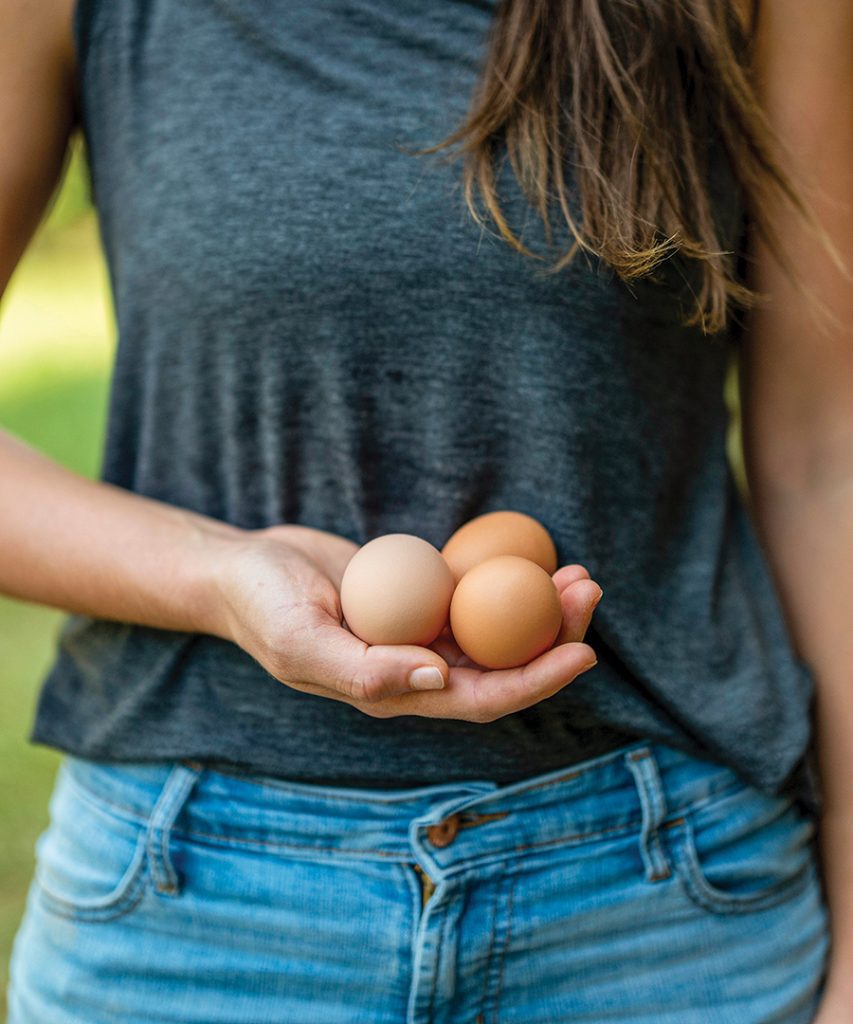
A moveable chicken coop, center photo, at New Town Farms in Waxhaw produces fertilizer for the large oaks owner Sammy Koenigsberg and his father planted years ago and compost for use in the fields. Birds are separated between “egg layers” and those grown for the meat. It’s the “dual-purpose” breeds, as Koenigsberg puts it — heirloom birds like Black Australorps, Dominiques and Rhode Island Reds that produce both eggs and plump meat — that are disappearing from the American farming landscape. “Those were a part of the old small farm America,” he says.
Redbro chickens, a variety that came out of the Label Rouge system in France and was brought to America in the early 2000s, is a slow-growing breed prized for its meat. “When farms incorporated the factory system, they narrowed it down to the most productive breeds — Leghorns for eggs and the White Cornish Cross for meat. So, over 99% of the chickens raised for meat are all one breed.” Meat grown faster has less flavor, “a blank canvas, like tofu, reliant on what you’re cooking with it. That’s what we’re used to,” Koenigsberg says. He took a different approach with his small family farm, and that effort pays off with a richer, more delicious meat.

